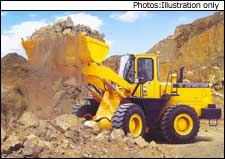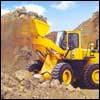As with any product that requires a large onetime capital expense, financing is a good way for the construction equipment industry to spark demand and acquire new customers. In 2011, India’s earthmoving and construction equipment financing industry was valued at Rs.23,000 crore, according to a report titled ‘Roadmap for Realising ECE Industry’s Long-Term Potential’ released at CII Excon 2013 in Bengaluru recently.
Financing accounts for about 80 per cent of equipment purchased. In the case of imported machinery, it’s even higher, with 90 per cent of equipment purchased being financed. However, the report pointed out that over the next few years, the ECE financing industry is expected to grow by a compound annual growth rate of 22 per cent.
 The downturn in the earthmoving and construction equipment industry is a temporary phase, experts believe. Relatively speaking, the smaller and medium customers are less affected as their portfolios are doing reasonably good, Devendra Vyas, Chief Executive Officer, SREI Equipment Finance, said, adding, “But large ECE equipment buyers, who are our large customers for finance, are faced with major challenges as most large projects have gone into financial trouble due to economic slowdown.”
The downturn in the earthmoving and construction equipment industry is a temporary phase, experts believe. Relatively speaking, the smaller and medium customers are less affected as their portfolios are doing reasonably good, Devendra Vyas, Chief Executive Officer, SREI Equipment Finance, said, adding, “But large ECE equipment buyers, who are our large customers for finance, are faced with major challenges as most large projects have gone into financial trouble due to economic slowdown.”
Finance companies are hopeful that the slowdown in demand has reached its bottom and from now the process of recovery would take place. “In my opinion, we are now touching the lowest point at the bottom and the curve will start moving upwards from here,” Vyas said. “But the nature of ECE business is such that India being a huge economy, even if it starts improving now, the actual impact on our business would start only after six to eight months.” The finance industry is hopeful that the demand for ECE finance will start booming from the end of 2014.
In the long-term equipment finance companies are highly optimistic as the Indian ECE industry will continue to witness strong demand emanating from the growing need of a developing economy. The government should also allow infrastructure developers to use ECB funds for buying equipment made in the country. Since ECB funds are cheaper, this will not only boost domestic manufacturing industry but also boost direct and indirect job creation, experts felt.











